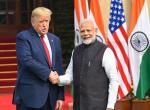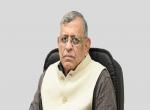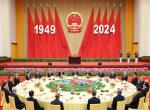Elections have a way to spring surprises. The recently held Presidential elections on 23 September, 2018, in Maldives will go down in history as one that not only sprang a major surprise but also one that ushered in an epic upset, that has potential of re-setting the process of the nation’s quest for democracy.
On the voting day, voters queued up in large numbers at almost all the designated islands, waited long past the official timing, to express their choice. The overwhelming turn-out of voters of 89.2% was a testimony to democracy itself. The voters also cast their votes in conclusive show of support (16.8 % more than his opponent) for Ibrahim Mohamed Solih, the candidate nominated by the combined opposition against the incumbent president Abdulla Yameen. This is being seen as a massive victory not only for Solih but a win for democracy, and an outright rejection of the autocratic style of leadership of Abdulla Yameen.
The final results announced by the Election Commission on September 29 also squashed the deep concerns and apprehensions of the international community and political observers at large. As the results were announced informally by the Maldivian Election Commission (EC) on the very next day (Sept. 24) the public euphoria was palpably high and obvious. But, there were underlying apprehensions of Yameen making a last dich attempt to annul the wishes of the people by taking recourse to extra-constitutional methods after Yameen’s party filed objections and urged the EC to pend the final announcement till their complaints were investigated. This did not happen as the EC notified the final count and declared Ibrahim Mohamed Solih the victor. In a bid to further assure the people of the irreversibility of the wishes of the people, the military and police leaderships also announced their commitment to honour the verdict; a rare move in a democracy, but certainly a timely and decisive message to all concerned to accept the result.
Maldives, a cluster of 1200 small islands few hundred kilometers from India southern tip of Lakshadweep Islands, has had a chequered history of unstable flirtation with democracy. A democratic system was ushered in, as late as in 2008, after over 3 decades of one man, one party rule. The new constitution provided for holding of elections to choose a president and the Majlis (Parliament) for a period of a five-year term, with each presidential candidate being eligible to hold two five-year terms. But the democratic transition has been fraught with uncertainty, as seen in the second round of presidential elections held in November 2013 which needed the Supreme Court intervention on allegations of fraud made by opposition leaders in the earlier round of elections held few months earlier. Abdulla Yameen, leading the Progressive Party of Maldives was declared elected as President through a runoff election held in November 2013, a year after the first democratically elected president Mohamed Nasheed, was forced to step down.
The third free and fair elections which has just been successfully held, was not without its share of immediate concerns. While European Union (EU) and the United Nations refused to send observers, given the unconstitutional ways of Yameen, apparently the Maldives Elections Commission had invited seven states including some from Europe, South Asia, Asia-Pacific countries and one from West Asia along with three international bodies to observe the election. But reportedly, a number of approved international observers were not finally issued visas fueling further fears and speculations about the possibility of elections not being free and fair. The last-minute raid at the opposition’s party office just a day before the polls, did nothing to calm the nerves which seemed on edge for longish period through the five years of Yameen’s term that significantly echoed autocratic ways, bypassing the norms of rule of law and clear subversion of dissent.
It may be recalled that Yamen had imposed two periods of emergency, the last being in February this year, lasting for 45 days, throwing every democratic norm outside with an outright showmanship of power and control. This last round of emergency was triggered by an inconvenient Supreme Court ruling asking for the release of political prisoners, including the former president Mohamed Nasheed. In abject negation of independent organs of democracy, Yameen ordered the arrest of the Supreme Court judges Abdulla Saeed and Judge Ali Hameed for overstepping. Not surprisingly, the official statement announcing imposition of emergency was precipitated by, ‘….. a Constitutional Crisis created by two Justices of the Supreme Court who conspired with political actors to violate both the Constitution and standard legal norms and practices in order to illegally overthrow a lawful Government, and whose actions constituted an imminent threat to national security.’ This was confirmation of Yameen’s excessive outreach.1 If this was not enough, disrespect for the Judiciary the president also arrested the police commissioner who had insisted on following the Supreme Court ruling. Having manipulated the Judiciary, he also evicted 12 members of the Parliament from their seats in the Majlis through a judicial process. The Parliament was similarly manipulated through amendments, altering election regulations on 9 July, which excluded certain individuals from contesting. The deposit for contesting election was arbitrarily raised from US$ 2600 to US $ 6500 and several voters, perceived as supporters of the opposition, were forced to register in islands far away from their places of abode. Many of these new regulations were introduced without majority support or even the required quorum in the Majlis.
In sharp contrast to Yameen’s over-powering personality, the consensus opposition candidate put up by the Maldivian Democratic Party (MDP), Jumhooree Party and the Adhaalath Party, the president-elect Ibrahim Mohamed Solih is a seasoned politician, a parliamentarian from 1994, one the founding members of the MDP, a pro-democracy activist well known for his reform efforts. He assumed leadership of MDP’s parliamentary group in 2011 after the ouster of Nasheed through a coup. He was fielded as the presidential candidate since Nasheed himself was ineligible to contest on account of his conviction by a court of law in 2015 and was living in exile. Former president Maumoon Abdul Gayoom was also effectively removed from the political scene through a conviction for 19 months handed down only in June this year. Evidently, Yameen had over stepped all limits in a desperate attempt to stifle any form of opposition to his quest for a second term in office, stretched himself far beyond even what the senior Gayoom was accused of during his 30 years rule that eventually ended in 2008.
In his election campaign, Yameen’s promised ‘transformative economic development,’ jobs and housing, issues of development, and support for Islam as his main agenda. Solih championing democracy on the other hand, promised to form a national unity government to provide transitional justice and bring overall reform in the political system, judiciary and the security services including a whistle-blower protection law. Solih also promised to examine allegations of massive corruption against Yameen that had been brought out in the open by the media. In fact, the allegations of corruption and stories circulating about his moving funds away to overseas account, would have added to his unpopularity. Despite his obvious manipulation of the system and governmental machinery, he was unable to successfully manipulate the voting in 475 or so voting locations.
The unexpected electoral mandate for Solih was largely due to Yameen’s excesses and autocratic and vindictive style of governance not going down well with the people. The repressive acts against his opponents, the second round of imposition of emergency in February this year and the sweeping arrests brought back bitter memories of the Gayoom era, which the people had rejected by transitioning to democracy in 2008. Yameen seemed to have exceeded his play and his anti- India stance clearly did not yield the dividends he had hoped for.
The political atmosphere in the run up of the elections was understandably charged and evoked several criticisms from the western democracies including the EU parliament which had almost written off the elections as rigged even before the first ballot was cast. The political environment had further vitiated with China and Saudi Arabia assuming larger role in affairs of the small island nation than was ever witnessed in the past. China, which in fact opened its embassy only post 2013, made quick progress establishing deep foot-hold in Maldivian economy. It successfully signed the Free Trade Agreement in 2017 within two years of negotiations and benefitted from the constitutional amendment that allowed foreign ownership of land against an investment exceeding US $ 1 billion. In 2017, Maldives and China signed agreements and MOUs in 12 key areas including health, banking, housing, economic and technological cooperation, road and infrastructure development and upgradation of the international airport. Tourism sector which contributes nearly 30 % to Maldives’ GDP, got a significant boost with the largest numbers of tourists coming from China in recent years.
The highlight of this bilateral engagement was the opening of the China-Maldives Friendship Bridge, (Sinamalé Bridge) built under the Belt and Road Initiative, on 30th August this year connecting Male with the Hulhule Island where Maldives’ main international airport is located. An engineering feat of 2.2 km long bridge, built at a cost of $184.44 million, it has been largely funded by China through direct aid and discounted loans to the Maldives, which accounted for 91.8 percent of the total investment. Hailing this as ‘dawn of a new era for Maldivians’ during the inaugurating of this bridge, with Yameen lapsing into Chinese language, highlighted the significance of this project and the growing depth of the bilateral tie.2 Some of the bilateral agreements with China in fact have a long term implications that will not be easily reversible. The defence agreements, including the proposed joint marine research observation station at Makhundhoo (not far from India) and several of the other large infrastructure projects that are underway or at proposal stage too have long term strategic implications.
China would have obviously planned big in terms of quickly exploiting Yameen’s willing overtures with a view to securing a strategically dominant position in the region vis-à-vis India and in Indian Ocean. Its deep disappointment could be discerned from the rather lukewarm messages emanating from Beijing in the aftermath of the announcement of the election result. More significantly, diplomatic observers would have taken note of the terse Chinese reaction to the incoming administrations intent to have a fresh look at the terms and conditions of various projects.
Apart from focussing on infrastructure and development projects, Yameen also reinforced ties with Saudi Arabia seeking collaboration in energy and transport sectors and was promised a five-year soft loan facility of US $300m in 2017. Promising to build ten ‘world class’ mosques, Saudi would also provide grant of $100,000 for Islamic education, announcing 50 scholarships for students to study in Saudi Arabia. With Maldives receiving 1.2 million tourists from Saudi Arabia, it was proposed to exponentially increase the number of flights operating between the two countries. Saudis, indeed other Arab countries too, have also collaborated with Maldives in areas of Islamic affairs.
As far as India is concerned, it remains a major trade partner after Thailand and Saudi Arabia. The close engagement they enjoyed in the past saw a distinct dip during Yameen’s rule for many of the reasons cited above. Viewed as precursor of democracy - not unexpectedly, India has often been requested for support to fend off invasion by foreign mercenaries or attempts of coup in the past - India looked at Yameen’s authoritarian ways and shifting strategic moves with justifiable concern. The specifics of these developments have been extensively reported in the media and hence, not being repeated here. Briefly, Yameen, while paying lip-service to the traditional ‘India First Policy’, was effectively destroying the time tested relationship.
In a reassuring gesture, the President-elect has promised to restore the ‘India First‘ policy. India will be closely monitoring the developments in the next few months, especially after the new administration assumes office in mid-November. Criticality of this island nation in India’s neighborhood can never be over emphasised. While bilateral relations with India has been dogged with controversy in recent years under Yameen, India’s muted responses during the pre-election days, now appears to be well thought out, signaling maturity and positively. While India was quick to congratulate Ibrahim Mohamed Solih, a high level political visit would be received well it would be a good opportunity to explore avenues for deepening engagement in defence and other core sectors that are mutually beneficial. Indian policy approach should continue to be calibrated and not over bearing posturing.
Undoubtedly, the next few weeks and months will be filled with uncertainty. As recent history would reflect, intrigues are never far from these islands and a wild card event to derail the popular verdict can never be ruled out. While Yameen has conceded defeat gracefully, promising smooth transfer of power, not only India but other democracies would welcome the reassuring statements from the military and police leaderships of their commitment to uphold the wishes of the people as expressed in the electoral verdict. The process of transfer of power and consolidation of the alliance under the leadership of the president elect will therefore be closely followed and monitored in most capitals in the region and beyond.
Given the history of over past four decade, Maldives will remain prone to high political drama. The ruling alliance of four distinct political parties has no option but to stay together with the prominent leaders subsuming their personal ambitions to ensure a period of political stability and to re-establish the rule of law in the country. In this process, the judiciary too is expected to play a vital role by shedding off the rather dubious display of partisanship in the recent times. It will soon be faced with the task of reviewing a number of its past verdicts in cases involving some of the important political leaders. The process has already begun with former president Gayoom challenging his conviction and securing bail. Soon one should expect the judges, police officials and political leaders seeking redress. The most high profile case likely to come up before the top court would be that of former president Nasheed, currently in exile.
While processes continue, the new government/coalition should also be cautious of the fact that their political campaign for reestablishment of democracy is only half complete; the Majlis election is not far away. Elections to the 85-member national legislature should be due next year. This will pose as important a challenge for the coalition partners.
References
- Official statement from the Government of the Republic of Maldives on the country situation since 1st February 2018 08 February 2018 , Ref: PN-2018-9208; at https://presidency.gov.mv/presidentNews/news/9208 downloaded on 25 Sep 2018
- It’s the Dawn of a New Era for Maldivians” says the President, 30 August 2018 , Ref: PN-2018-9995 at https://presidency.gov.mv/presidentNews/news/9995 downloaded on 25 Sep 2018
Image Source: https://c.ndtvimg.com/2018-09/fbsjo5a4_ibrahim-mohamed-solih-reuters_625x300_24_September_18.jpg











Post new comment